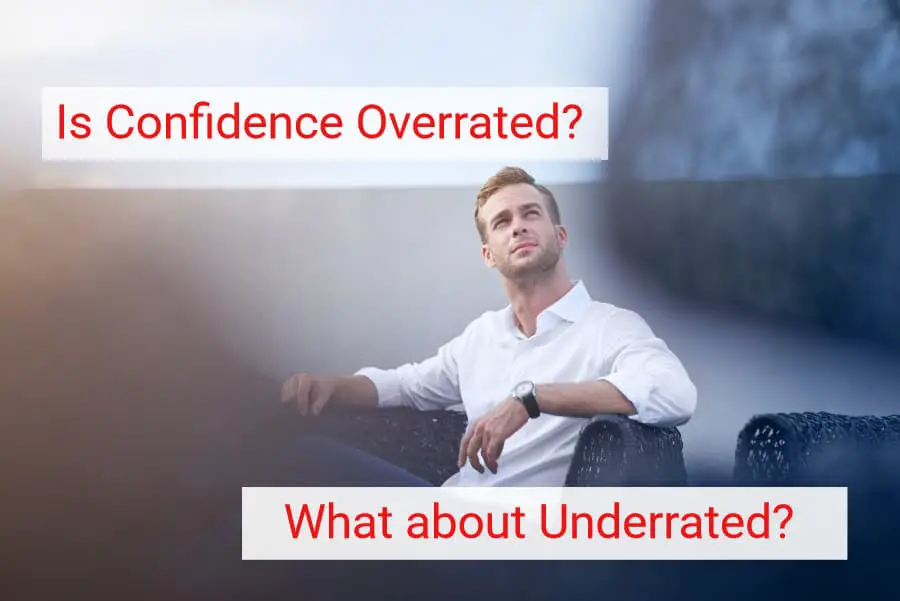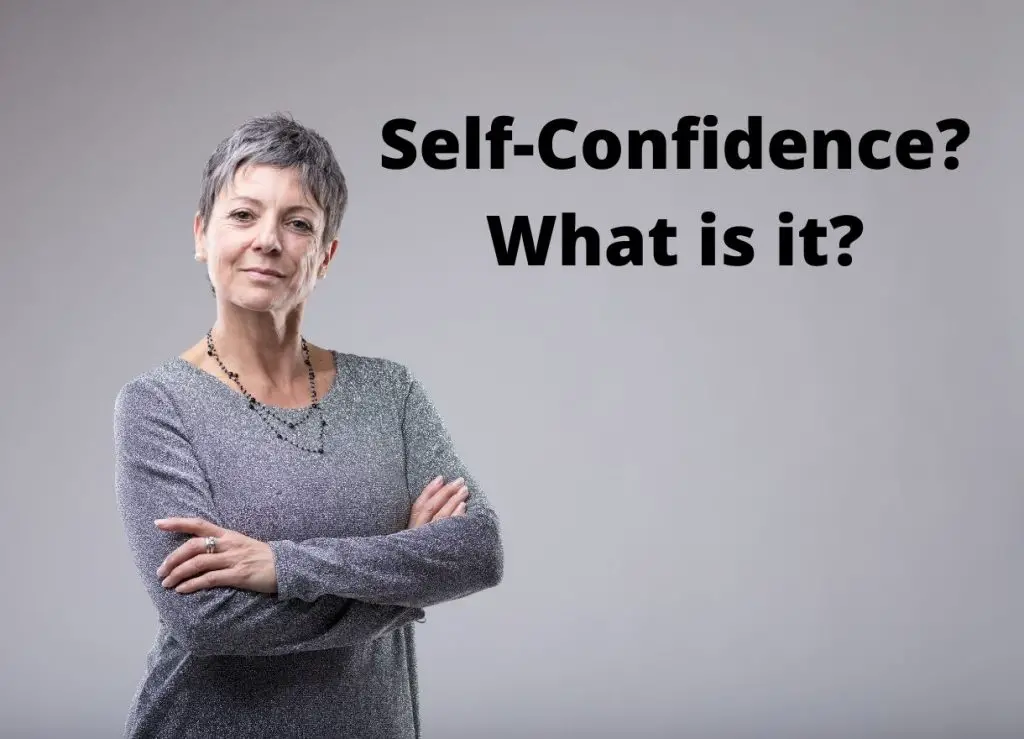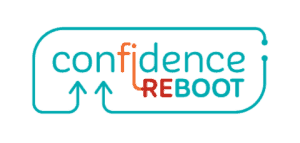
Updated February 18, 2023 – “Forget about confidence! Good looking parents make good looking kids. They grow up confident and perpetuate the cycle. That’s just how it works. All the discussion about getting confidence is overrated,” he said. This went down at a friendly get-together.
Whose opinion was it? It was a neighbor’s guest. The conversation left me wondering about whether confidence is underrated, overrated or somewhere in the middle. So I started researching, and this is what I found out.
So is confidence overrated? Confidence, when sought after like a skill that can be learned vs. a trait that comes naturally as a result of competence, is in fact overrated. Unfounded confidence simply stands in the way of really being connected with reality.
Confidence is a bit like a seesaw over a pit of alligators. If there is too much or too little you are going to be in trouble. “Overconfidence” comes at the risk of taking actions that are too risky and result in pain and “not being confident enough” keeps you too safe, potentially unable to take appropriate risks to learn new skills.
Another aspect to consider is illusory superiority (I.S.). I’ll explain this concept in a minute, but first let me ask you:
- How do you know if you have too little or too much confidence?
- Do you suffer from I.S.?
- What’s the perfect balance?
Let’s look at what a popular study had to say about being confident.
In the “better-than-average bias” study, people were asked whether they had better than average driving skills and how they’d rate themselves.
- 85% people consider themselves as having Mario Andretti-like diving skills. This is I.S. (Illusory Superiority)
- When told about the bias (that most people would overestimate their abilities), 80% responded that it did not apply to them. Again we see I.S. at play.
- The study ran similar models for a sense of humor and other things and the results stayed the same.
What does this mean? It means that we all stand a better than average chance of overestimating our own abilities.
Obviously overestimating your abilities or qualities is, well, “average.”
Illusory Superiority (I.S.) – A cognitive bias that has people perceive their own abilities and qualities as better than those of others.
Wikipedia – https://en.wikipedia.org/wiki/Illusory_superiority
Because we know statistically that most people overestimate their abilities, a good place to start when considering our own levels of confidence is knowing that we will most likely do the same.
Confidence requires an interesting balance. On the one hand, it most likely helps us be a bit over-optimistic about our qualities, which does well for us by promoting a “healthy” self-image.
On the other hand, it can stand in the way of humility, which keeps us grounded an in touch with reality. Humility is a trait to be admired as well. Many game changer goals have come out of individuals who were willing to serve out of humility.
We could learn a lot about self-confidence from a pair of sunglasses.
Sunglasses are a bit like confidence in that, we recognize when others are wearing them, and we may find ourselves often wishing we had a pair like theirs. Similarly, we notice when other people are confident and we may secretly crush on their confidence, aspiring to be more like them.
But just like sunglasses, we don’t wear them all of the time. Most of us have had the experience of confidence being elusive. It shows up powerfully in one set of circumstances and diminishes during others, it’s hard to pin down.
Have you ever wanted to talk to someone you liked? In that moment did the nerves, butterflies and lack of self-confidence show up telling you, “Don’t do it.”
Yet, consider when someone dared you to do something that was scary but went unbelievably well. Both situations involved risk.
But for some reason, you assigned a different meaning to each. You had more to lose in one situation versus the other, and it was all perception.
Table of Contents
Is Confidence Fake It Till You Make It?
Confidence is an important factor in determining success, but it’s not the only one. In fact, research suggests that confidence can actually be overrated when it comes to achieving goals and reaching your full potential.
It often takes more than just believing in yourself; you need hard work and dedication, too.
For example, we would all most likely agree that getting into the ring with a fighter would take a super-sized level of confidence.
Have you ever watched the fighters talk to each other during a pre-fight interview? Often the cockiness and arrogance are palpable. If you look up over-confident fighters “getting what they deserved” on YouTube, you will notice a myriad of options.
This is a clear example of confidence being overrated. In the ring, skill trumps false confidence. Even if the skill is “appearing more confident,” the fighter with the most skill usually gets better results.
I might get some hate mail on that statement, but I think you get my drift. Looking at the law of averages, skill disproportionately trumps sheer swag over the course of time.
It’s a mathematical equation: Skill/Swag over time hypothesis. Just kidding. I’m trying to sound smart here guys.
Moving on.
What Is Self-Confidence?

Self-confidence is self-belief, self-faith. It is the ability (to be willing) to accept any outcome due to your action regardless of whether the outcome is good or bad.
With so much discussion around what confidence is and what it isn’t, it might be time to take a different approach. To better understand what self confidence is and how it works, let’s look at the opposite. Let’s call it self-humility.
Self-Humility – Say What?
Sometimes to understand things better it is good to look at the opposite and simply ask the same questions about it.
Earlier we asked the question is confidence overrated. What would happen if we asked the same about humility?
Should you try to have more humility? Should you fake it till you make it humbly?
As soon as we start asking these questions, you might notice a bit of uneasiness show up. The question seems odd, right? If you are on a blog wondering if you can learn to be more humble then your goal is to excel in humility?
Hold the phone, Frank. Can you imagine someone standing up in front of a room saying, “Ehem, ladies and gentlemen, my name is Tom and I just want you to know that I have finally done it. I have become by far the most humble person I have ever witnessed. I challenge any of you to outperform me in humility.”
No way!
We would see through that from a mile a way. But when it comes to our own power of confidence we don’t see it quite the same. We just assume they are the ones who have been gifted with the sunglasses and they are awesome.
But the truth is that when we see other engaged in self-promotion, we should stop to question it. Understanding that, just like the better-than-average bias, we are often fooled by individuals who just sound like they know more than we do. That should be your first clue to look a little deeper.
Maybe Confidence Is An Underrated Quality?
Now that we have looked at whether confidence is overrated, let’s take a moment to consider whether it is underrated.
I think in today’s society where we have dating gurus telling us to be more confident (because that is what everyone admires), there is an
They might as well be telling us to be rich. Don’t get me wrong. It’s all achievable, but I think we all agree that there is a huge gap between looking rich and being wealthy.
The same gap resides between looking confident and being confident, or looking skillful vs. being skillful.
I don’t think confidence is underrated, but we should go about it by looking to gain skill, comfort and ease within the scope of the things we want to be confident in, rather than “faking it.”
Confidence should not be the goal at all. Skill should be the goal and confidence will follow.
Is Confidence Hereditary?
This question comes up a lot. It is usually asked by individuals wondering if they can measure up to others. Most likely if they are asking the question, they sense a deficit, which might preclude the existence of the confidence gene in their DNA. Read the full article here.
There is some indication that confidence is biological, but there is still a lot you can do towards building confidence, even if you aren’t born with the scales tipped in your favor.
Likewise, humility comes through personal growth, and even if you aren’t born with a ton of humility, life experiences can teach us to live a more humble life.
Why Do Most People Lack Self-confidence?
Self-confidence is a complex concept, and there are many factors that can contribute to a lack of confidence.
Some people may have had traumatic experiences in their past which causes them to second guess themselves or feel like they’re not good enough.
Others might be dealing with low confidence due to body image issues, bullying, or just feeling like an outsider.
It can also be difficult for some people to break out of their comfort zone and take risks if they don’t believe in themselves.
All of these things can lead to a lack of self-confidence and the inability to reach our goals and dreams.
Limiting beliefs can also have a huge impact on your self-confidence. They can cause you to doubt your abilities and lead to feelings of worthlessness or low self-esteem.
These beliefs might be based in fear, past experiences, or negative feedback from people around you.
When you become aware of these limiting beliefs, it’s important to challenge them and focus on positive thoughts instead. Once you do that, it’s easier to start believing in yourself and build up your confidence again.
At the same time, it’s important to remember that confidence isn’t the only thing that matters. It’s possible to achieve success without necessarily having high self-esteem.
Hard work and dedication can go a long way in helping you reach your goals, even if you don’t believe in yourself all the time.
Having supportive people around you can also make any challenge seem much more manageable and provide you with the motivation and determination to keep going no matter what life throws at you.
So yes, confidence is important but it’s not everything—it’s just one piece of the puzzle. Having faith in yourself and striving for success will ultimately get you where you want to be!
Books You May Enjoy
Here are some books I recommend if you want to take actionable steps towards building internal self-trust and building your confidence skills.
For a list of more books, click here.
Validation Is For Parking: How Women Can Beat the Confidence Con

As women, we’re often told to “be more confident”, but we either don’t know how to do that or we feel like we need to be perfect in order to gain confidence. This book gives you the tools to change your internal dialogue from self-limiting to having super-charged confidence “muscles”!
On My Own Side: Transform Self-Criticism and Doubt Into Permanent Self-Worth and Confidence

This book, by the author of Not Nice gives specific guidance and exercises to help you put an end to self-criticism and judgment, so you can build your inner confidence and self-worth.
